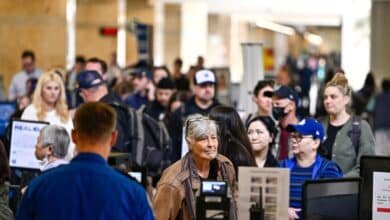‘I feel very scared’: some Americans fear losing coverage due to proposed medicaid cuts

The key components of the bill to finance the agenda of President Donald Trump seek to provide large tax exemptions by reducing spending elsewhere, including mass cuts to Medicaid.
Medicaid is a joint program of federal and state health insurance for disabled and low -income Americans. Medicare centers & Medicaid Services (CMS) works with state programs to administer Medicaid, under which more 71.2 million people They are registered.
Medicaid offers benefits that include care for nursing homes, personal care services and assistance to pay premiums and other costs, according to CMS.
A analysis From the Congress Budget Office, Estimates of Medicaid cuts could increase the number of people without medical insurance by at least 8.6 million by 2034.
“Medicaid is an important security network for so many Americans,” Jennifer Mesik Kennedy, president of the American Nurses Association, told ABC News. “When we look at the most vulnerable and most unattended, it will affect these groups disproportionately.”
Many Republicans have insisted that Medicaid cuts are only to eliminate fraud, waste and abuse and will not result in lost coverage for those who need it, which was repeated during this week’s testimony by the Secretary of Health and Human Services, Robert F. Kennedy Jr.
But some Americans who trust Medicaid for their own coverage, or coverage for their families, told ABC News to worry that the cuts can reduce their ability to receive medical attention or force them to choose between paying coverage or paying the needs.

President Mike Johnson talks to journalists when he leaves the house of the house at the United States Capitol, on May 15, 2025 in Washington.
Kevin Dietsch/Getty Images
‘I feel very scared’
Rosa Andresen, from Southgate, California, has been the caregiver of her 27 -year -old daughter during the last 13 years.
His daughter, Amanda, is disabled and has conditions that include cerebral palsy and a convulsive disorder. More than a decade ago, Andresen left his job in a data entry recovery company to take care of his full -time daughter.
Andresen, 54, said that Amanda is covered by Medicare and Medicaid, which has helped pay diapers, seizure medications and mobility tools, such as a shower chair and a ramp to help her climb and lower stairs.
It is not clear if Amanda would lose the coverage of Medicaid under the new proposal, but, if he did, it would be a massive blow to his care, Andresen said.
“It’s very devastating,” Andresen told ABC News. “I am very, very sad, and I feel very scared for the well -being of my daughter. I could drastically affect her health and her life, the quality of life she has.”
Andresen said he is afraid to receive a letter by mail telling him that his daughter is no longer eligible for Medicaid or that he will take Amanda to an appointment with the doctor and will discover that his daughter cannot receive attention there or that a certain medication can no longer be prescribed.
She said she has tried to see if she could get private insurance for her daughter, as through her husband’s work, but insurance companies supposedly told her that people with chronic diseases do not cover.
According to him HHS“Health insurers can no longer collect or deny your child’s coverage due to a pre -existing health condition such as asthma, diabetes or cancer, as well as pregnancy.”
While California has Medi-Cal, which is the implementation of the state of the Federal Medicaid program, Andresen said he does not know what the program would cover and what he would have to pay from his pocket.
“I use government assistance to buy food, such as [electronic benefit transfer]To put food on my table and if I also have to use money from my pocket, I don’t know if I will be able to do it if [have to] He decides to buy my daughter’s medication or put food on the table, “Andresen said.
Work requirements could endanger attention
Four years ago, Jodie Montplaisir, a mother of five from North Hampton, Massachusetts, was fighting with opioid use disorder. She was discouraged, unemployed and separated from her children.
Montplaisir said he realized that he had reached a low point and that he needed help. She entered an opioid treatment program (OTP), paid by Medicaid.
“I really thought, ‘I need to fix my life’, and I did,” said Montplaisir, 38, ABC News. “I really stayed with the clinic and doing all the meetings, all groups, all my therapy, simply using the clinic … and they really helped me.”
Montplaisir is now three years in his recovery, which currently lives in an apartment, meets his children and has a job working with people not made.
Currently, Medicaid covers his treatment assisted by medicines, and attends Clinic Weekly to keep himself responsible. However, he fears that any interruption, such as bureaucracy or new requirements, can endanger his progress.
“If I didn’t have Medicaid, I wouldn’t have been able to do the clinic,” he said. “There is absolutely any possible way. If I did not have Medicaid and the help of the system, I would not have been able to do it alone.”
The Republicans proposed invoice It would impose the work requirements for Medicaid recipients with the body, at least 80 hours per month, or would require registering in an educational program for at least 80 hours or some combination per month.

Mary Beth Cochran, activist, speaks against the budget resolution of the House of Representatives in front of the United States Capitol in Washington, on February 25, 2025.
Nathan Posner/Anadolu through Getty Images
Not all Republicans are in favor of the bill in their current form. A growing number of members of the Republican Party of the House of Representatives express complaints, some because they do not believe that the bill does enough to protect vulnerable Americans and others because it does not include some of the most drastic cuts that Republican intransigent were pressing.
Montplaisir said that if the work requirements were in force when he was in OTP, he would have made it impossible to concentrate on his recovery, and will make it difficult for the people who now work.
While the draft of language has exemptions for certain adults, including those who have a substance use disorder, Montplaisir concerns that show that an exemption could be complex and can result in a lost coverage anyway.
In addition, trying to prove work requirements instead of focusing on recovery could derail people’s progress, he said.
“Medicaid is there to help us … How are we supposed to work if we are trying to be sober?” Montplaisir said. “If I had to have paid money while trying to be sober or have to work while trying to be sober, it wouldn’t work.”
John Parkinson and Lauren Peller of ABC News contributed to this report.





